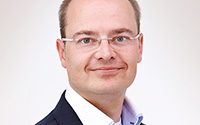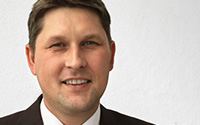



Interview with Dr.-Ing. Axel Gomeringer & Dr. Jan Bredau of Festo
Festo, an industrial control and automation company out of Germany, has always been a market leader, driving the manufacturing industry with innovative products and ideas. Originally founded in 1925 by Albert Fezer and Gottlieb Stoll, the company has since grown to have more than 17,000 employees distributed throughout its many sales subsidiaries, distribution centers and factories all around the world. Each year Festo invests more than 8% of revenue into R&D projects, and through this investment, they have managed to become one of the leading producers of Industrie 4.0 applications in the world.
The Global Success Club is proud to have two of Festo's top executives with us at the upcoming Turkish-German Innovation Summit in Istanbul. This December, Dr. Jan Bredau & Dr.-Ing. Axel Gomeringer of Festo will both hold separate panels on Predictive Maintenance 4.0 and Smart Manufacturing for the Future. In preparation for the event, the GSC interviewed both speakers about their thoughts on Industrie 4.0 and the importance of Turkish-German business collaborations in manufacturing. The full interview you can find below.
GSC: Since the start of Festo back in the beginning of the 20th century, Festo has been a company that strives for excelence in everything it does. They do this by always keeping up-to-date with technological advances, and even helping the advancement of such technologies themselves. Can you please tell us a little more about Festo's stance on Industrie 4.0, and what the company is doing to help it thrive in the world?
- Festo takes a holistic view from different perspectives of the changes in the production world, which are being discussed under the heading ‘Industry 4.0', and besides technology also takes other points of view into account, such as the interaction between humans and machinery or the issue of training and qualification. Together with partners from science and industry, Festo is researching new solutions and technologies for the production of the future and is involved in various research projects funded by the German government. The requirements of Industry 4.0 have now been accommodated in products for the first time, and are also being realised in the company's own production at the Scharnhausen Technology Plant.
GSC: In your session at the upcoming Turkish-German Innovation Summit in Istanbul, you will be discussing whats called smart manufacturing for the future. Could you please just give a overview for us now what you mean by smart manufacturing?
- Dr.-Ing. Gomeringer: Alongside mass production, which will continue to be very important, there is also a trend in industrial production towards the individualisation of products. That is why more flexible production facilities are needed. By using components that are independently networked in an intelligent way, configure themselves and are therefore capable of ‘plug and produce', production facilities are able to meet the steadily growing requirements immediately.
GSC: How determined is Festo in implementing these smart manufacturing systems in their own facilities? Has there been a big push by the company in the last couple years to turn their facilities into so-called "smart factories"?
- Dr.-Ing. Gomeringer: Initial approaches of Industry 4.0 are already being put into practice in our production facilities. Our innovative Scharnhausen Technology Plant is designed as an adaptable and future-oriented factory.
- Many of the aspects and solutions for Industry 4.0 are there already reality today or will be implemented in the near future. For example in valve terminal assembly, employees interact directly and in absolute safety with a flexible robot, which acts as an assistant to the human operator and relieves him of ergonomically one-sided tasks. A networked energy transparency system currently being established will ensure transparency regarding the flow and consumption of energy at the Technology Plant by systemically analysing the interplay between consumption levels in production and in the building.
- For service engineers, the tablet is now an indispensable tool that helps them to rapidly find technical faults in machinery or to carry out orders directly on site and the entire plant is emulated in the form of 3D data, which will be used in future for the planning of new processes and job sequences.
GSC: In your session at the upcoming Turkish-German Innovation Summit, you will be talking about predictive maintenance in manufacturing processes. Can you please describe the idea behind this, and why it is so important for manufacturing companies today?
- Dr. Bredau: The objective of every manufacturing company is the produce goods in the best quality at the optimal cost level. Manufacturing companies therefore have established continuous improvement processes to enable an always better productivity, quality and cost of their manufacturing lines. While in the past this has worked very well we observe that new approaches are needed to further optimize the production. Condition monitoring, which has been discussed already for many years can help identify problems in production lines based on appropriate sensors and help increase transparency of the relevant factors for improvements. Predictive maintenance is a further development which combines current sensor data – e.g. consumption of a pneumatic cylinder – with its expected lifespan (from the testing phase) and other relevant sensor data of the production process (vibration, speed, ...). Based on this it is possible to predict product failure in time before it actually occurs and enable the repair during regular maintenance cycles of the machine. This increases total quality of the produced goods as well as improves productivity and reduces costs as unplanned downtime of the machine is reduced.
GSC: Currently located in 176 countries around the world, Festo has quite a large reach in the world today. At the locations abroad, like say in Turkey, how determined is the company to work with local companies, research institutes and organizations in innovating solutions for Industrie 4.0?
- Dr.-Ing. Gomeringer: Collaboration with partners from science and industry is a critical success factor for Festo. Cooperation beyond company borders not only accelerates the innovation process. The technological issues that we face are becoming increasingly complex – it is therefore better to overcome them together.
GSC: Where do you see the future of Industrie 4.0 leading the manufacturing industry? How do you see production facilities looking like in 10 years? 25?
- Dr.-Ing. Gomeringer: In our view, the production world will change in an evolutionary manner: functions from higher levels will be moved downwards – components will therefore be able to carry out orders at a superordinate control level. Not only will there be fully automated production processes in future therefore, but increasingly adaptive concepts
- In order for the associated small quantities and high level of variety to be profitable, we will need technologies that not only continually adapt themselves to changing conditions, but also to the fact that humans want to interfere at any time to modify certain parameters. Not only will there be fully automated production processes in future therefore, but increasingly adaptive concepts. In order for this to work, we need intelligent components in production – in other words components that assume the functions, for example, that were originally found in the superordinate control level. Besides information technology, precision engineering and microsystem technology play an important part in this respect.
GSC: We thank you both for your taking time out of your busy days to speak with us and look forward to seeing you soon in Istanbul.
